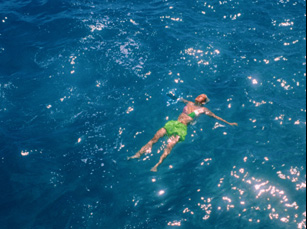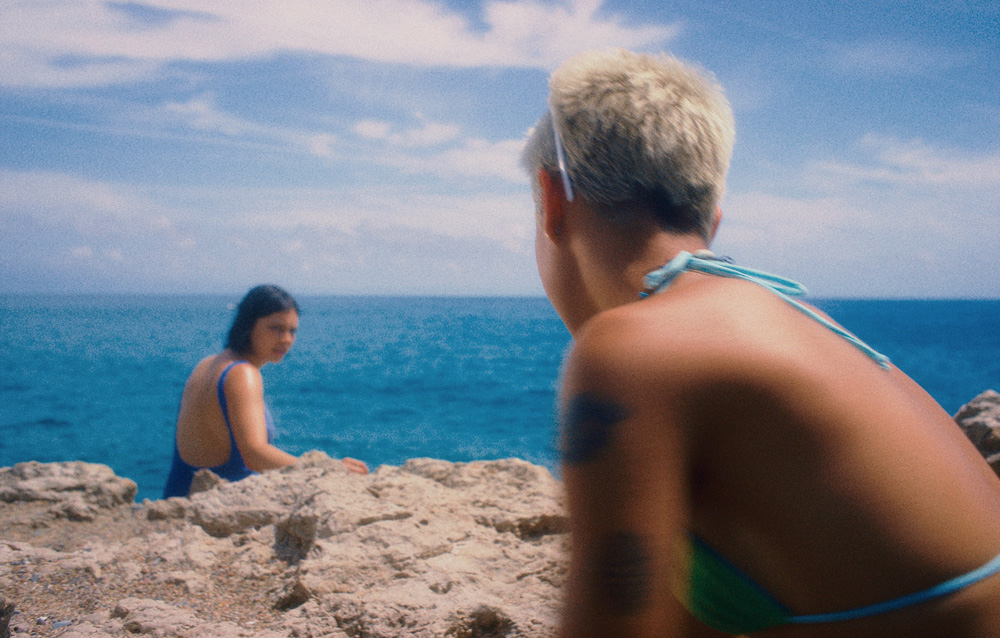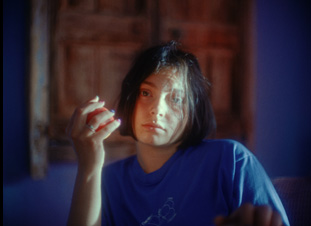Despite being set amidst the beauty of the Catalonian coast in Spain, “Ripe!” was no day at the beach for filmmakers Kerry Furrh and Olivia Mitchell, who are better known as the dynamic directing duo Tusk.
“I broke my arm!” Mitchell says in reference to giving her all to the project, which was particularly unfortunate when the film already had a protagonist recovering from such an injury and she couldn’t take inspiration from it. Still, it’s planted the seeds for the next if there’s a trend of life imitating art. “Now, I’m going to write a film about winning the lottery.”
To some degree, it’s the audience that might feel that way after diving in to Tusk’s enchanting short about Sophie (Raina Landolfi), an American ex-pat tooling around the dirt roads of Spain on a bicycle, largely indifferent to the fact that her boyfriend Henry has been prevented from making the trip as she tries to immerse herself in the culture. The simple country life looks to have a strong appeal and it isn’t long before she feels the pull of Gloria (Rita Roca), a local bleach blonde she meets by the pool, but things get complicated when the two join a local soccer game and instead of putting a ring on it, Sophie ends up sticking her with a cast around Gloria’s right arm. Although Gloria is the one in pain, Sophie is the one in anguish, unsure of a way forward with Gloria at first after sending her to the hospital and even less after Gloria forgives her so easily and the two look like they could make a good couple.
Tusk packs a feature’s worth of romance into the vibrant 18-minute short, full of intense bursts of passion and abrupt cuts that reflect how Sophie is kept off-kilter by the possibility of a new love, her first queer relationship and a potential partner that she is both infatuated and frustrated by her cool attitude towards everything. Unlike Gloria, “Ripe!” is a lot easier to get a read on when the emotions are rendered so vividly in the film where rich colors can be found everywhere from the sky above to the just picked peaches, and even in the irresistible personality of the actors. With the film already making a splash at Tribeca where it stands out as a particularly refreshing respite from the hustle and bustle of the city, Furrh and Mitchell spoke about making a triumphant return to the festival where they first made a name for themselves with the 2016 short “Girl Band” (co-directed with Cailin Lowry), the success of which may have sidetracked them with steady work in music videos and commercials, and how that pent-up energy fired them up to make “Ripe!”
Olivia Mitchell: We were traveling in Spain when it started. Kerry and I had been doing a lot of commercial music video work for years and years…
Kerry Furrh: And we got burned out.
Olivia Mitchell: Yeah, we got really tired. We’re very location-based directors and we get really inspired by the spaces we’re in, so we decided to go visit rural Spain. We went to Catalonia and visited a few towns and we were extremely moved and inspired by the environments and the people that we met. There’s one town in particular in the La Bisbal area [where it felt like] we were in this time capsule from the 16th century. We’re staying on this farm and we started thinking about a character who, like us, was experiencing a new country, culture, landscape, food, and was really changed by it.
We’re very inspired by these dreamlike romances like “Call Me By Your Name” and “Before Sunrise,” and it felt like we had found ourselves in the middle of one without really realizing it. We had been doing a lot of commercial work and realized we had writer’s block for narrative.
Kerry Furrh: And in our commercial and music video work, we’d been pitching queer stuff, but nobody really ever let us do that, so we were like, “We have to make it ourselves,” and it was a culmination of these things that [led to this] just pouring out. We were able to just write it so quickly, like a matter of days.
Olivia Mitchell: We were up ’til like 1 a.m. on this random farm, like finally we have a story after years of no ideas. Then we met this wonderful person Rita Roca, who was actually a waitress at this tiny restaurant we went to…
Kerry Furrh: She was perfect for Gloria.
Olivia Mitchell: Yeah, she actually ended up being the actor. We cast around the world and could not find anyone that was as perfect for this part. A year later, we were back and filming [with her].
You really can see she has this incredible charisma and personality separate from the character. Did she help to shape it in your mind?
Olivia Mitchell: Yeah, we only met her for a few minutes at this restaurant, so we didn’t know her super deeply, but her energy was striking. She was very confident. We’d always laugh because we ordered our food and she told us our order was wrong. She was like, “You didn’t get enough. You must get more.” And we’re like, “Oh my gosh, this 16-year-old has so much conviction.”
Kerry Furrh: But then she brought us the food and the drinks and [when we said], “This is so good,” she’s like, “Thank you,” and we found that interesting because she was a waitress but taking so much pride in the actual quality of the food and the drinks. There was a lot to her that was very interesting.
Olivia Mitchell: She’s very committed and she takes ownership over what she does. She had a lot of pride that spills out of her.
Was Raina actually an American living abroad or did you bring her to Spain?
Olivia Mitchell: We brought her in. She’s based in New York and we had found Rita already for Gloria and then we were looking and looking for Sophie. We watched a bunch of auditions…
Kerry Furrh: But she didn’t submit to our casting call. She submitted to a different project we were doing, and she wasn’t right for that character, but we’re like, “Hey, would you want to submit for this other project?” And she’s [said], “Yeah, sure,” so it was a random way that it came through.
Olivia Mitchell: But she was awesome.
Kerry Furrh: She had a ferocity to her that like was not quite like what we had imagined, and I think it brought a different dimension to Sophie than what we were really thinking.

Olivia Mitchell: What was interesting about it was we were rehearsing with them via Zoom for months. We would meet every couple of weeks with both of them. And we were nervous about them meeting. They were from different continents. And we were excited, but you you never know what’s gonna happen.
Kerry Furrh: We believed in both of them separately and believed that there would be a way to make it work [no matter what]. They met each other on Zoom and then in person. I mean, we did a lot of like rehearsals. Then once we got to Spain and everybody was there, we were there probably like two weeks before.
Olivia Mitchell: And we did lots of fun little dinners and field trips and walks through Spain.
Kerry Furrh: And we just did a lot of like thinking about the script together and talking about it and then we were in Barcelona for a little bit and we moved down to where we shot, which is like 45 minutes south and for just the first weekend, it was a small group of people — Rita and Raina, our producer, Cookie [Walukas] and our [director of photography] Pablo [Gallego] — and we were staying in the house that we filmed. We actually just did some camera tests with everybody and a lot of that footage ended up in the movie — a lot of the stuff in the pool was not originally scripted, but we put it in because it felt really right. It was all just testing to see what lenses we wanted to use, what the environment looked like, and the style we’re going for.
Olivia Mitchell: And [Raina and Rita] had this wonderful connection. There’s a shot in the film where they tackle each other by the pool that I find so interesting. To me, it epitomizes that queer panic tension, but they just did that [spontaneously]. We were hanging at the pool and just filming, so it was the product of a lot of prep and conversations that made it better than we could have imagined.
Let me circle back to the camera tests because the film has such a beautiful glow to it. What was it like to get the look just right?
Olivia Mitchell: Everybody says this and we’re so grateful. We worked with Pablo Gallego…
Kerry Furrh: He is from the Canary Islands and lives in Spain. We met him through Japonica [a Barcelona-based studio] and before we even met him, there was just something so stark about and so committed in his work that we don’t see often in DPs. He was really engaged in the project from the beginning, [saying] “I connect to the story. I’m a Gloria,” and he was really obsessed with finding the right lenses. We also have such a high-key style in lighting, but we had such a low budget that we were trying to figure out how can we achieve this [where] it’s a slice of life as much as it has like a pop to it.
Olivia Mitchell: [There were] so many zooms between Kerry and Pablo, discussing all the lighting references. Pablo wrote these beautiful essays and Kerry was coming in with all these references and the two of them worked so hard to get this look.
Kerry Furrh: Even the language too, and the way the shots unfold in the edit where a lot of times we don’t want to set up a wide shot and then come in closer, we just want to just come in on something really close up. For example, in the scene where they’re in the market and it starts on a shot of the peaches and [Raina’s] hand goes in and it’s like the typical formula would be to set up the environment with the wide [shot], so if she walks in, then we cut to the peaches, but instead we wanted to throw people right into something, so we use that language a lot. It was something we discovered early on and started to repeat it through scenes.
Olivia Mitchell: And we used mirrors a lot to reflect light and used some intense filtration, which was a choice.
Kerry Furrh: Yeah, it scared our colorist when we brought it. We sent Kaitlyn Battistelli, the colorist on this, the raw footage with this crazy filter on it — a filter that most people don’t use on an entire film. It’s used in pieces and she [said], “Yeah, this is kind of scary at first to see how much,” but then she made it look beautiful. Going really far in one direction and then picking pieces in the color session that we could really sharpen allowed us a lot of flexibility.
Olivia Mitchell: But on that day of test shooting, Kerry and Pablo, we were all sitting around the camera and we had two Pro-Mist [filers] and they were going between the full Pro-Mist diffusion and then the one that was just a little bit because those are the only two options we had. So we’re like, “Do we go all the way?” It’s a little more than maybe we [usually] would do, but they were going back and forth. There’s a scene in the film where they flip, [where it] goes from being not filtered to being filtered.
Kerry Furrh: When Sophie sees Gloria at the pool, you don’t see the lens.
Olivia Mitchell: That’s the moment we decided we have to commit to this look.
I love that moment, and you mention how the look shaped the edit – you have five credited editors, which is a bit unusual for any film, let alone a short, but the film unfolds quite fluidly. Did having all those eyes on it actually help create this hypnotic effect that it has?
Olivia Mitchell: It was the most unique and wild edit process.
Kerry Furrh: Why there were so many editors was purely because of resources. We had a limited budget and people have their own jobs, so we [told our editors], “Do what you can do. We don’t expect you to have to stay on this project until the end,” so we passed it off to people we love and respect and felt like they could bring something really great to it.
Olivia Mitchell: They each [contributed] something. We took it to start an assembly, and then in between each pass with someone else, we take it, tweak it, and send it to someone new and Christa Philippeaux and Eduardo Cohn, a wonderful editing duo, came in…
Kerry Furrh: They laid down the foundation.
Olivia Mitchell: They put a cut down, which was so scary.
Kerry Furrh: I think that’s the hardest part. Then we did a pass ourselves. That took forever.
Olivia Mitchell: And then Manuel Crosby came and he’s so talented…
Kerry Furrh: And he was my partner in film school. We just caught up with him and we’re like, “Would you be interested in doing a pass?” And he was really interested in the story and he created that intro. We had something like that, but he put in this voiceover and this idea that the boyfriend’s sending voice memos [to Sophie], and then we went and recorded it. Then Bridget [Arnet] came in after that and really helped with a lot of the final polish and the style — a lot of the quick cuts [are hers] and she’s a great sound designer too. We had a sound studio, One Thousand Birds also do it, but she set this tone and style of the music.
Olivia Mitchell: She has an aesthetic we admired for years. She was saved in our Instagram folder, so we’re like, “I think she’s the final [pass].” We sat with her for days and days and as we were having our filmmaker panic, like “we have to finish it,” every frame was checked and adjusted and massaged and rhythmically paced with Bridget at the end. But everybody was integral and it was amazing.
What’s it like to return to Tribeca? I know “Girl Band” made a pretty big splash here.
Olivia Mitchell: It’s crazy. Tribeca changed our lives.
Kerry Furrh: We love Tribeca.
Olivia Mitchell: On “Girl Band,” we didn’t really know what we were doing.
Kerry Furrh: And we didn’t know really what Tribeca was when we submitted it the first time.
Olivia Mitchell: Full confession, I thought Tribeca was in Canada. This is how out of touch I was.
Kerry Furrh: But then we went and we got our agent from the first time that we were there…
Olivia Mitchell: And we were in New York Magazine, and then Ben Thompson at Tribeca has been so supportive. I always tell him, he really helped us launch a career because we work as directors full-time now. We’ve been able to stay busy with commercials and music videos and really got to refine our craft in a way we hadn’t before “Girl Band.” So now eight years later, we’ve shot with wires and goats and stunts. We’ve really practiced a lot.
Kerry Furrh: And on a personal level, we weren’t out the first time we were at Tribeca and now we’re out and with a film that’s a queer film, so it means a lot.
Olivia Mitchell: We’re taking more ownership over being back this time and feel ready for it.
“Ripe!” will screen at the Tribeca Festival at the AMC 19th St. East 6 on June 11th at 6:15 pm, June 15th at 5:30 pm and June 16th at 2:15 pm.





